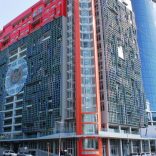Historic low water levels recorded in Mozambique’s Zambezi Basin – ARA Centro
Mozambique: Growing inequality confirmed, fuelled by policy benefiting better off – Hanlon

The study notes that inequality is higher in Mozambican urban areas than the Africa average. Maputo city has the highest inequality. [File photo: Lusa]
“An imbalanced growth path disproportionally benefited the better-off and caused increasing inequality, especially in more recent years, curbing the necessary reduction of poverty”, concludes a new study by the United Nations University World Institute of Development in Helsinki. This significant increase in inequality is “characterised by the emergence of a non-subsistence economy in Maputo and other urban areas, in a resource-based country, with a shrinking public sector, the expansion of education and the emergence of a small but highly educated elite.”
The study notes that inequality is higher in Mozambican urban areas than the Africa average. Maputo city has the highest inequality.
Nearly half the population remains below the poverty line and inequality is increasing, especially in recent years, “due to consumption disproportionately increasing among the better off”.
Statistics are often misused or misunderstood in Mozambique, so the study is particularly useful because it confirmed increasing inequality with various methods, including Gini, Lorenz and Generalised Entropy.
The paper on the South African Journal of Economics is by Carlos Gradin and Finn Tarp and is available, free, on https://onlinelibrary.wiley.com/doi/epdf/10.1111/saje.12215.
Click HERE to access and download the pdf full document.
By Joseph Hanlon












Leave a Reply
Be the First to Comment!
You must be logged in to post a comment.
You must be logged in to post a comment.